SUMMARY
This is AI generated summarization, which may have errors. For context, always refer to the full article.
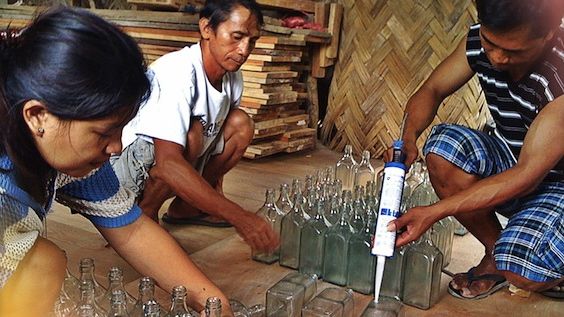
MANILA, Philippines – Bianca Silva tells me she is giving up.
She tells me this right after I introduce myself, even before I get around to asking my first question.
“How’s your project?” I ask, by way of breaking the ice. The brown-skinned, short-haired 25-year-old in front of me was the woman behind an environmental advocacy program. She is small and skinny – hardly the image of someone out to clean up a remote mountain community by teaching locals to recycle bottles and turn them into works of art.
But Bianca has been working with the Batad community for more than 6 months. She has been devoting her time, effort and money turning bottles into tables and building functional toilets in a personal advocacy she called Project Rehouse.
Today, though, she tells me she’s moving out.
“It started out well,” Bianca says. “There was the power of words, the influence of these words and the art I do that propelled people into volunteering.”
But something did not quite work out in that space between intentions and implementation, and her project underscored the difficulty of introducing new ideas in a community entirely different from one’s own.
The garbage problem
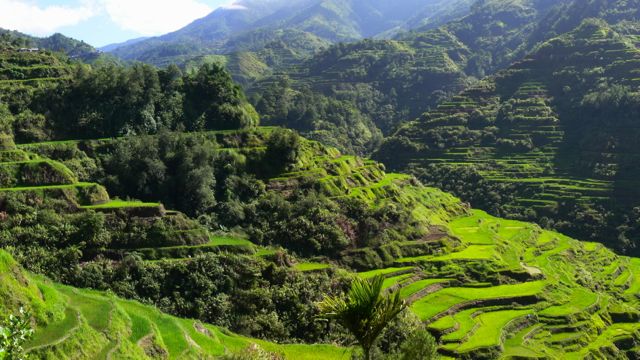
Batad in Banaue is known for its “amphitheater” terraces built by the Ifugao people and made world famous by its inclusion as a Unesco World Heritage Site. Agriculture is still the primary source of livelihood, although Batad’s popularity among travelers – both local and foreign – has made tourism a growing industry as well.
In a 2000 paper published in the UP Diliman Review of Women’s Studies, Remedios Mondiguing noted how the tourism industry created new business opportunities for some of the residents. The shift from agriculture to tourism also gave birth to new needs – and problems.
“The influx of tourists necessitated the building of houses, lodges and other accommodation facilities without the benefit of rational planning,” Mondiguing wrote. “Consequently, sewage, waste disposal and water distribution problems in the community have arisen.”
That was what Ramon Binalit, a local tourist guide in Batad who runs a homestay inn, wanted to address. He met Bianca when she came to Batad after a chance encounter with a local resident.
Tired of city living, Bianca decided to move from Manila to Sabangan, Mountain Province. Living in the mountains however required a radical change in lifestyle, and it was there that her skill with the arts came in handy: she created her own furniture out of ordinary materials, like empty gin bottles.
“Once, while I was out on a trip, I showed the pictures of my gin bottle table to one woman,” Bianca says. “She liked them so much, she invited me to come and build a table for her too.”
A new idea: Project Rehouse
From the simple plan of recycling bottles to make into a table, the idea snowballed into something bigger. Why not help create a waste management system and help locals recycle their own trash? It was an audacious goal, and Bianca’s friends jokingly dubbed her the “provincial garbage man,” but she was serious, and in 2012, she decided to move to Batad to oversee the program.
Ramon saw this as an opportunity to raise awareness about the problem. “I wanted to involve myself and my homestay as a pilot program,” he says. “Malaking problema ang basura sa Batad. Dapat malaman ng mga tao na kailangang matugunan ito.” (Garbage is a big problem in Batad. People should know it must be addressed.)
“Tourism came too early in Batad,” Bianca adds. “They didn’t know what to do with their trash.”
Together, they built a table made out of cleaned up and recycled bottles, piecing them together with glue and silicon sealant. The gin bottle table was a hit: tourists would come to Ramon’s inn and ask how it was made, and soon, other residents wanted one too. Bianca saw it as an opportunity to dare more.
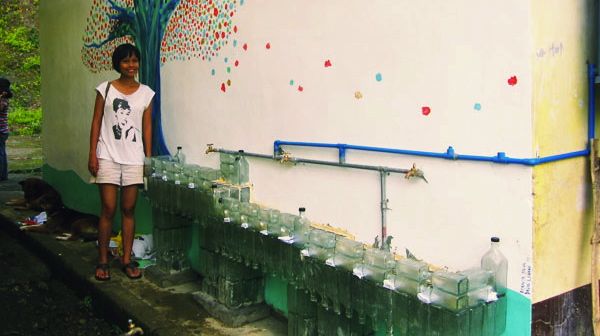
This was what Project Rehouse was about: a zero-waste environmental advocacy program aimed at recycling trash and turning them into functional items. Bianca wanted to recycle the bottles – there was an abundance of them in the town – and make bricks and tables out of them. She wanted to set up a waste segregation system. She envisioned creating a washing area for the school, and a toilet walled up with bricks decorated with recycled bottles.
Her dream peg: an “earthship,” a home made of recycled materials, an idea propagated by architect Michael Reynolds. The house is designed to be sustainable: able to create its own electricity, produce its own food, and use and reuse household sewage.
But cleaning up a village requires more than just collecting trash and turning them into something useful. It involves more than just going into a community and introducing new plans.
Community resistance
The novel ideas she introduced elicited enthusiasm at the start. Local schoolchildren came to dig out trash from the school’s garbage pit, packed and sealed dirt into cut-out plastic bottles, and turned them into bottle bricks. On a good day, they made a thousand bricks – enough for use in building compost pits and segregation bins.
As time passed, interest in the project also waned. Materials cost more than Bianca had expected and they did not have the support of big-ticket backers. Weeks passed, the amount of bottles waiting to be turned into tables remained plentiful, but the people needed to turn them into functional works of art were missing.
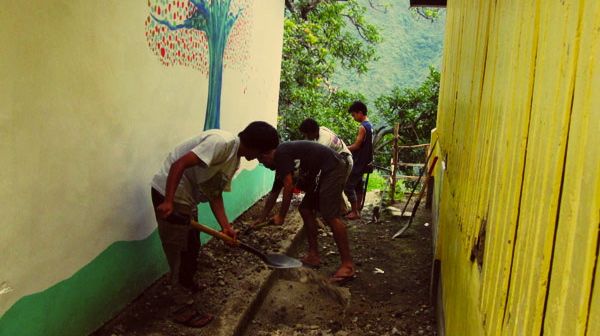
When asked why her project failed, Bianca says she does not know. She doesn’t understand, she says, why she had a hard time getting volunteers for something meant for the community’s benefit.
“We talked to the barangay captain, we told him we observed how waste is a problem in their community,” Bianca says. “The locals understand the logic on why we want to help them. They all know it’s a problem.”
But she says many would rather engage in the tourism business, or else want to get paid for helping collect trash or building the toilets.
Introducing a new system to a community different from one’s own – with different value systems, cultures and traditions – may be met with resistance unless it’s consulted with the community as well. In her study, Mondiguing acknowledged the need to hold a dialogue with locals before coming in with a proposal.
She wrote, “Based on my personal experience and as noted by one of our women resource persons, it is useless to implement anything in Ifugao without consulting the people first.”
Mondiguing added, “There is a need to feedback our findings and recommendations…not only to validate them, but for the community to be made aware of the issues so that they themselves can decide on what to do about it.”
Ramon attributes the problem to a mindset that did not yet understand the gravity of the situation. “Ang mindset, bahala na ‘yung gobyerno,” he says. “Alam ng mga tao na problema ang basura pero hindi pa naiintindihan ang impact ng pagkakalat.” (The mindset is, let the government take care of it. Everyone knows garbage is a problem but they do not understand yet the impact.)
Moving forward
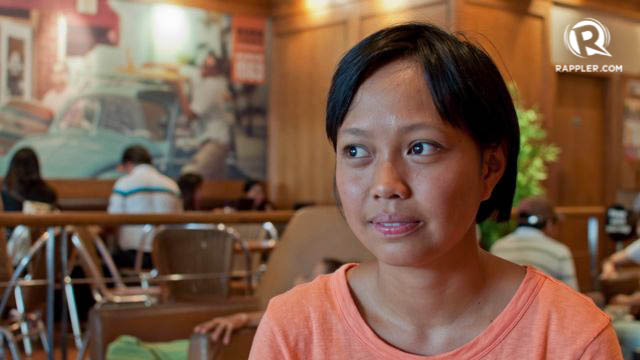
Bianca originally intended to stay a year or even 3 in Batad, but she says that path isn’t sustainable anymore. She’s moving out of Batad and heading back to Manila, and trying to figure out what to do from there.
“Maybe I should’ve done some things differently, maybe it’s not the right time for Batad…I don’t know,” she says. “I may sound a little bitter, but I believe in this project and I still plan to continue.”
Although her experience was not the success story she envisioned, Bianca says the dream isn’t dead. She plans to take a short break before trying her luck elsewhere—maybe Kambulo and Mayoyao—and hope things turn out differently.
Her goal remains the same: to create art through recycled materials and inspire people to see the value of turning trash into something functional.
“These can be interesting landmarks for remote communities to gain tourists who are into the environment,” Bianca says. “Tourists are coming in to see waste being changed into something else. It’s a gamble.”
In her last blog post, she writes: “I fell flat on my face on my leap of faith in Batad. Yes, I was heartbroken [but] I need to believe in this dream all the harder.” — Rappler.com
Add a comment
How does this make you feel?
There are no comments yet. Add your comment to start the conversation.